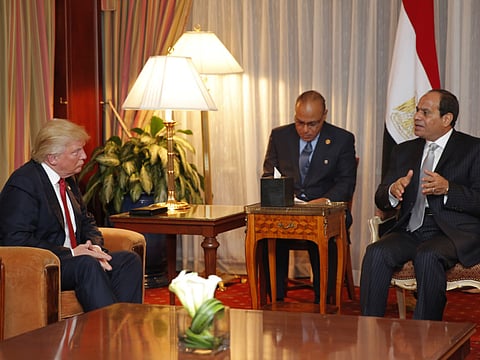Al Sisi to make landmark visit to Washington
Meeting at White House signals new era in ties between Cairo and Washington after years of strains

Cairo: The upcoming meeting between Egyptian President Abdul Fattah Al Sisi and US President Donald Trump at the White House signal a new era in ties between Cairo and Washington after years of strains, analysts have said.
Al Sisi will meet Trump on Monday, marking the Egyptian leader’s first visit to Washington since he took office in 2014.
He was the first Arab leader, in fact, to congratulate Trump on his presidential victory, signalling an obvious affinity to the new US president.
He previously visited US three times to attend the annual UN General Assembly meetings in New York but he did not go to Washington.
“This visit will open a new page between Egypt and the US,” Saeed Al Lawindy, an expert at the semi-official Al Ahram Centre for Strategic Studies, said.
“It will give the president a chance to make use of the new policy of the Trump administration to secure fresh US political and economic support for Egypt,” he told Gulf News.
Egypt is a traditional regional ally of the US, but their relations soured under the Obama administration after the army, then led by Al Sisi, deposed in mid-2013 president Mohammad Mursi, a Muslim Brotherhood leader, following mass protests against his rule.
In a sign of displeasure, the US froze its military aid to Egypt and delayed the delivery of warplanes. Later, US released them in order to support Egypt’s campaign against militants linked to Daesh in Sinai.
However, the relations between the two countries remained rocky in the post-Mursi era.
Despite this, Al Lawindy said, the US and Egypt cooperated in several fields, but mostly in fight against terrorism. In a telephone conversation following his inauguration in January, Trump told Al Sisi that his administration is committed to boosting cooperation in fighting terrorism and pledged military assistance to Egypt.
“The visit will also bring US closer to declare the Muslim Brotherhood a terrorist organisation like Daesh and [Al-Qaida-linked] Al Nusra Front,” Al Lawindy said.
"Trump is different from Obama whose administration used the Brotherhood to consolidate its policy in the Middle East,” Al Lawindy added.
In late 2013, the Egyptian government declared the Muslim Brotherhood a terrorist organisation and accused it of involvement in a string of deadly attacks in the country. The Islamist group has denied the accusations.
Egypt is hoping that the Trump administration will designate the Islamist group a terrorist organisation.
In January, US Secretary of State Rex Tillerson said that he considers the Muslim Brotherhood and countries that support it the main source of terrorism.
Last week, the White House said that Trump and Al Sisi will use their meeting to boost relations between the two countries.
“The meeting between the two presidents has a special importance,” said Egyptian lawmaker Dina Abdul Aziz.
“Their talks will outline a new strategy in the Egypt-US relations in view of a new American vision regarding the world,” she said in a press statement.
The fight against terrorism will top the agenda of their meeting, Dina Abdul Aziz said. “Trump is opposed to Obama’s policies which sought to integrate Islamists into politics.”
In his inaugural speech in January, Trump vowed to eradicate “radical Islamist terrorism”.
Some Egyptian observers, however, have cautioned against having high expectations from Trump.
“Undoubtedly, the presence of Trump in the White House represents an opportunity to improve ties between US and Egypt,” said Mohammad Kamal, a professor of political science at Cairo University.
“Leaders of both countries believe in fighting terrorism, are hostile to political Islam and reject the idea of imposing democracy. Still, it is important not to exaggerate prospects of improving relations between the two countries under Trump,” Kamal wrote in private newspaper Al Masry Al Youm.
The main reason for this, according to Kamal, is Trump’s views about his allies.
“Trump regards relations with US friends and allies as a deal whereby the allies are committed to supporting the US whenever they are asked to do so. With this in mind, Trump may ask Egypt to send its troops outside its borders to fight terrorism or avoid opposing his expected decision to move the US embassy [from Tel Aviv] to Occupied Jerusalem,” he argued. “Such issues can complicate relations between Egypt and the US.”
Kamal also questioned US olans regarding Egypt’s battered economy. “US economic aid to Egypt is only $150 million [a year]. An increase in aid or reaching a free-trade pact between the two countries is unlikely because such moves contradict Trump’s economic leanings,” he argued.
There is also a very little likelihood that US will increase its military aid to Egypt, the most of which is spent on maintenance and spare parts rather than buying new weapons.”
Egypt has been receiving US economic and military assistance since 1979 when it signed a peace treaty with Israel.
Sign up for the Daily Briefing
Get the latest news and updates straight to your inbox



